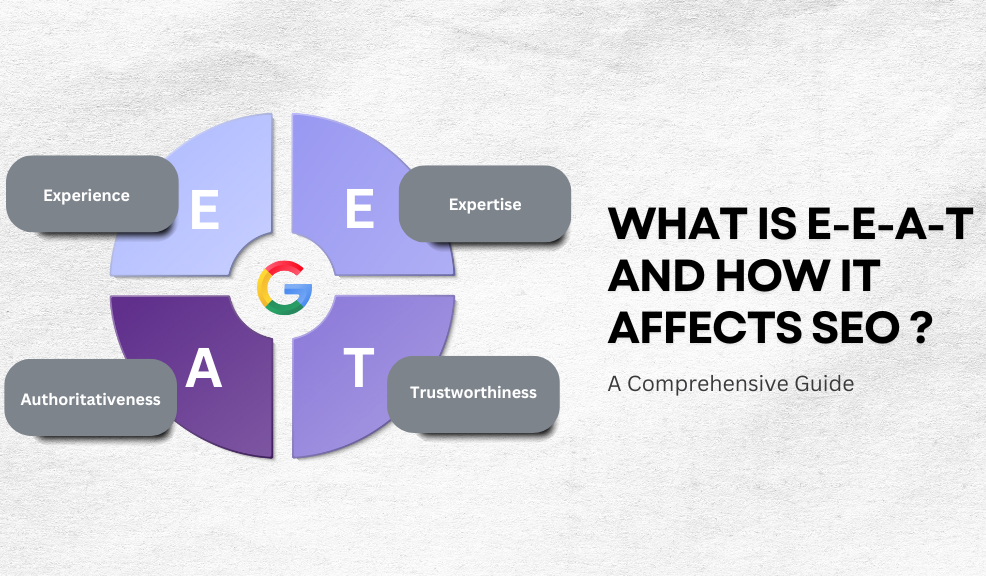In the ever-evolving world of search engine optimization (SEO), Google’s ranking factors continue to shift to ensure users receive high-quality, relevant, and trustworthy content. One of the most crucial aspects of Google’s ranking criteria is E-E-A-T, which stands for Experience, Expertise, Authoritativeness, and Trustworthiness. This framework is an essential factor in determining the quality of web pages, particularly for sites offering medical, financial, legal, or other critical information.
In this article, we’ll explore what E-E-A-T means, why it’s important for SEO, and how you can optimize your content to align with Google’s guidelines to improve rankings and visibility.
Understanding E-E-A-T
The concept of E-E-A-T is not entirely new. It evolved from the original E-A-T (Expertise, Authoritativeness, Trustworthiness) framework introduced in Google’s Quality Rater Guidelines. The addition of “Experience” in late 2022 represents a significant shift in how search engines evaluate content quality.
Breaking Down the Components of E-E-A-T
Experience
Experience represents the practical, hands-on knowledge that content creators bring to their work. It’s about demonstrating real-world understanding and personal insights that go beyond surface-level information.
For instance, a review of hiking boots written by someone who has actually used the product in various terrains carries more weight than a generic product description. The personal anecdotes, specific observations, and practical insights provide genuine value to readers.
Expertise
Expertise goes beyond simply having knowledge. It’s about demonstrating deep, comprehensive understanding of a subject matter. Search engines look for content created by individuals or organizations with proven qualifications, professional experience, or recognized authority in their field.
This doesn’t always mean formal credentials. A passionate hobbyist with years of hands-on experience can demonstrate expertise just as effectively as someone with academic qualifications.
Authoritativeness
Authoritativeness relates to the reputation of the content creator, the website, and the brand. If a website is recognized as a leader in its industry and cited by other authoritative sources, it is more likely to rank higher.
Trustworthiness
Trustworthiness measures the reliability and accuracy of content. Websites that provide transparent information, secure user data, and have positive customer reviews are more likely to gain trust from both users and search engines.It involves:
- Clear, accurate information
- Transparent ownership and contact information
- Secure website infrastructure (HTTPS)
- Positive user reviews and testimonials
- Consistent, ethical content practices
Why E-E-A-T Matters in SEO
Google prioritizes high-quality, credible content in its search results to ensure users receive accurate and valuable information. Here’s why E-E-A-T plays a crucial role in SEO:
- Impacts Search Rankings – Google uses E-E-A-T as a guideline to evaluate the credibility of a website. Pages that demonstrate strong E-E-A-T are likely to rank higher.
- Reduces Misinformation – Websites that provide fact-checked and well-researched content are more likely to be trusted by Google and users.
- Essential for YMYL (Your Money or Your Life) Pages – Websites covering finance, health, legal, and safety-related topics need strong E-E-A-T to rank well.
- Boosts User Engagement – Trustworthy and authoritative content improves user retention, reduces bounce rates, and increases conversions.
How to Optimize for E-E-A-T
Create High-Quality, Expert-Driven Content
Ensure your content is created by individuals with firsthand experience and expertise in the subject. To enhance credibility:
- Include author bios with qualifications.
- Cite reliable sources and link to authoritative websites.
- Provide case studies, personal experiences, and detailed insights.
Establish Authoritativeness Through Backlinks
Backlinks from reputable sources strengthen your authority. To gain authoritative backlinks:
- Publish guest posts on high-ranking sites.
- Collaborate with industry experts and influencers.
- Get cited by trusted websites and media outlets.
Enhance Website Trustworthiness
To improve trustworthiness:
- Use HTTPS to ensure a secure browsing experience.
- Display clear contact information and business details.
- Feature real customer reviews and testimonials.
- Maintain a transparent privacy policy and terms of service.
Improve Your Website’s User Experience (UX)
A well-structured and user-friendly website enhances trust. Ensure:
- Fast loading speeds and mobile responsiveness.
- Easy navigation and clear design.
- Content is free from grammatical errors and misinformation.
Leverage Schema Markup for Better Visibility
Using structured data markup helps Google understand the context of your content. Implement:
- Author schema to showcase credentials.
- Review schema to highlight customer feedback.
- FAQ schema to improve SERP visibility.
Encourage User-Generated Content (UGC)
User-generated content, like reviews and testimonials, builds trust and credibility. Ways to leverage UGC include:
- Encouraging customer reviews on Google Business Profile.
- Featuring real testimonials and case studies.
- Engaging in social media discussions.
Regularly Update and Refresh Content
Outdated content can reduce trust and credibility. Keep your site updated by:
- Reviewing older articles and adding fresh insights.
- Updating statistics and linking to current, authoritative sources.
- Removing or revising inaccurate or irrelevant content.
Measuring and Improving E-E-A-T
While E-E-A-T is not a direct ranking factor, it influences SEO significantly. To measure and improve it:
- Use Google Search Console to track search performance.
- Analyze backlinks to assess domain authority.
- Monitor engagement metrics like bounce rate and time on page.
- Collect and showcase customer feedback.
- Stay updated with Google’s Quality Rater Guidelines.
E-E-A-T is a fundamental aspect of modern SEO strategies that impacts search rankings, credibility, and user trust. By focusing on experience, expertise, authoritativeness, and trustworthiness, websites can improve their SEO performance, increase traffic, and gain a competitive edge.
Implementing the strategies outlined above will help you build a strong online reputation, enhance content quality, and meet Google’s evolving standards. Prioritizing E-E-A-T will not only boost your search rankings but also establish your brand as a trusted source in your industry.
By consistently delivering valuable, expert-driven content, you can stay ahead in the competitive world of SEO and achieve long-term success in search rankings.
